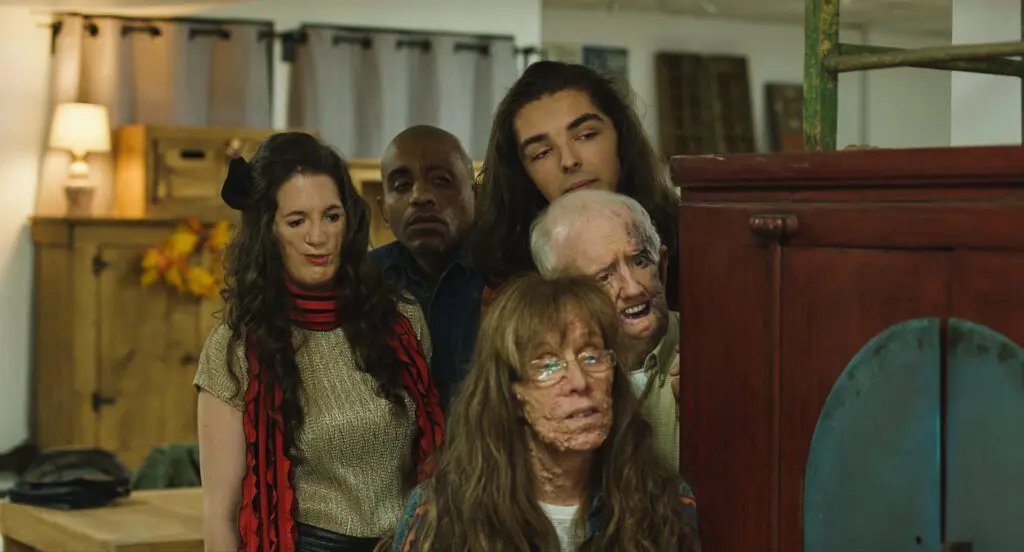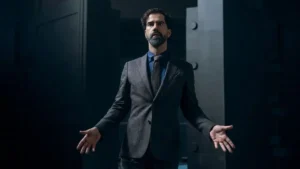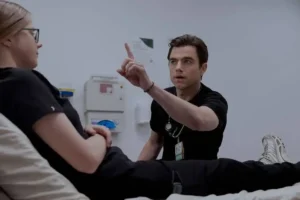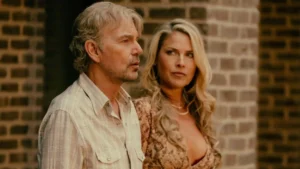Summary
A beautiful young man finds his way out of his own prejudices and helps a group of people with facial conditions handle the prejudices thrown at them. Interesting and dramatic, without cliché or saccharine.
After my most recent reviews of thought-provoking films, I had planned to get back to some escapist horror. Despite that, I pressed play on Happy Face, which – despite having its UK premiere at FrightFest 2019 – is not a horror film as such: it does not set out to shock or horrify, but it certainly sets out to challenge its audience to think about what horrors some people face (excuse the pun) in their own lives and in other people.
Happy Face: La tyrannie de la beauté (just called Happy Face since spreading farther afield than its original Canada) is the story of nineteen-year-old Stan (Robin L’Houmeau) and his time with a hospital-run support group for people with facial differences. Oh, and it’s set in the early nineties, when it was easier to say words like “disfigured” or “deformed”. Anyway, much like the Fight Club narrator, Stan is a pretender; but he’s not going for bizarre kicks: he wishes to understand such people better, as his beloved mother Augustine (Noémie Kocher) is being put through the terminal wringer by cancer.
Stan’s mother calls him “beautiful”, reads with him from de Cervantes’ “Don Quixote” about two types of beauty: the body and the soul. She herself cannot stand what the disease has done to her appearance and takes it out on her son, who knows only too well it’s already put a wedge between them. I don’t blame the poor, naïve young sod for being confused and clumsy in his dealing with this issue. The other members of the group don’t blame him, either. He offers to use his privileged position (unblemished face and body) to help his now-friends into the wider world and that’s where the film’s richness starts.
The members of the support group are (apart from Stan) played by people who all have real facial issues, whether from congenital conditions, injury, disease, or other causes. Otis (David Roche), Jocko (E.R. Ruiz), Maggie (Alison Midstokke), Beckie/Buck (Cyndy Nicholsen), Dangerous Dave (Daniel Boloten), and others did not have to go through hours of make-up or prosthetics but instead present themselves as they are. Even in twenty-first-century cinema, this is a radical approach to both representation and casting: some of these people were used to performance, but others were found via real-life support groups. The acting – naturalistic though it is, of course – is superb (Nicholsen was the one who stood out to me), and these real people also brought authenticity to the writing. I gather that a good deal of the content relating to feelings and experiences came from their own lives, and some found involvement in this film project to be truly cathartic.
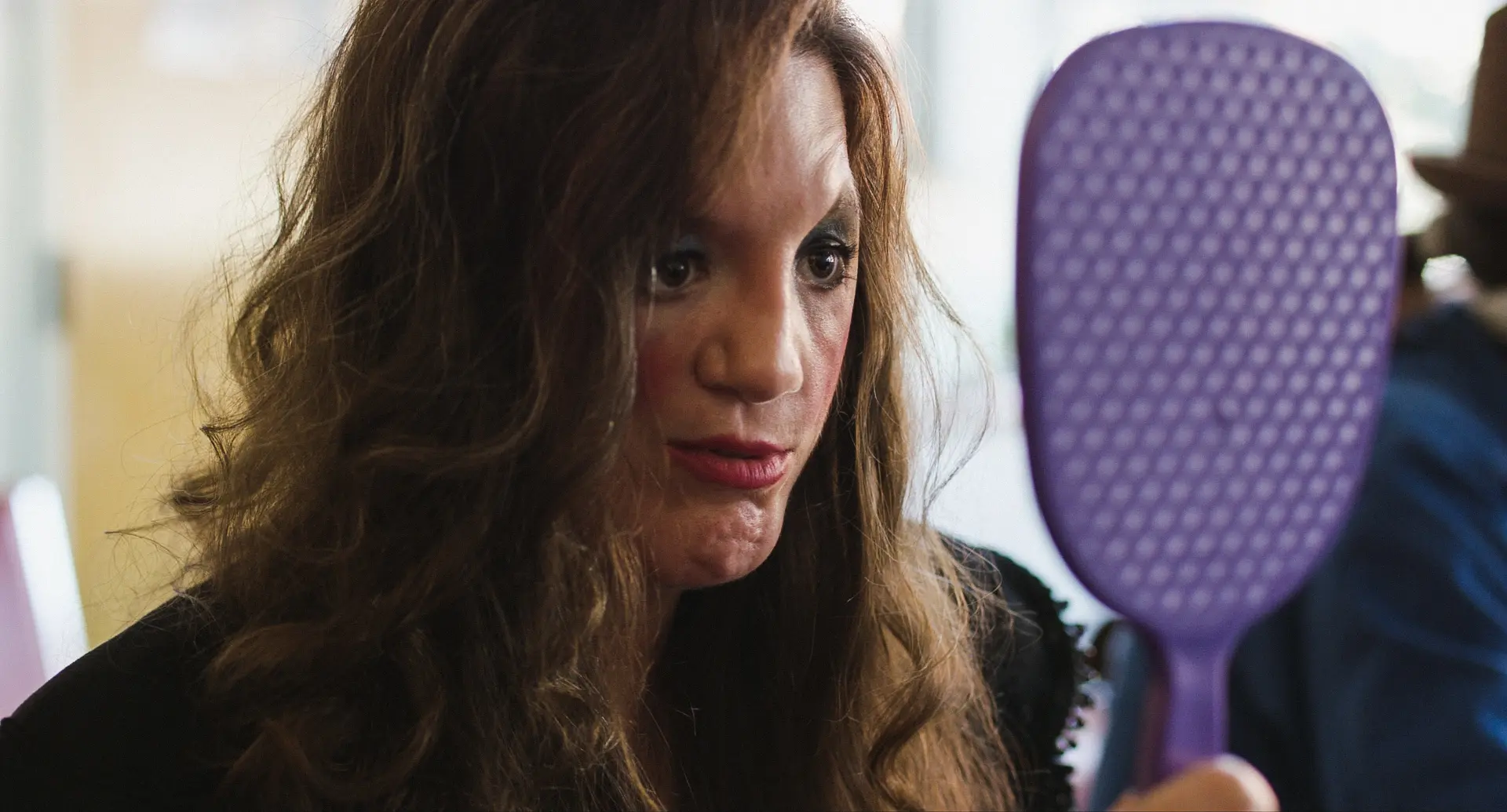
The only character who didn’t feel quite right to me was the facilitator of the support group, Vanessa (Debbie Lynch-White). I had no issue with the acting, and most of the time the writing was good, but the contrast she brought to the rest of the group seemed contrived. Perhaps this was down to a poor first impression: Vanessa opened Happy Face with an introduction to the group, but included in that a comparison between her experiences of being stared at as an overweight person with theirs as “freaks”. I don’t believe any real therapist would make such a misstep (and get away with it).
Virtually every character had a story arc of growth to go through, and Vanessa was no exception. Many of them were unpredictable and they were all fascinating, as we got to know these people, while they got to know themselves some more. Interestingly for what could be seen as a “cause film”, not all of their development was equally successful or straightforward. Happy Face is no cheery “inspiration porn”, but allows everyone the individual humanity that they are entitled to, and at the same time, the voice that they would rarely be granted. The film was utterly mixed in its presentation (misguided, plain-talking, innocent, abrasive), and that meant it was difficult to see what it was trying to do at first, but I ended up with respect for the writing: representation, after all, needs to include a diverse range of lives. And besides, there is no “happy path” in life.
Directed by Alexandre Franchi, who also wrote the film (partly from his own history with a mother who had cancer) with Joelle Bourjolly, Happy Face is as much about the confidence we get from our appearance as it is about the prejudices of the world around us. It’s not a preachy film, something I had half expected before watching, though it does come close at times: hardly a surprise when “facially different” people are craving acceptance and respect. I admire the way that Franchi avoids banging on about a clear or clichéd message. There were several times in the film when the group addressed people bad-mouthing them or staring – either giving back, ignoring them or turning it into a joke – but it kept on happening. Perhaps there is nothing that can be done to change prejudice on the ground, except chipping away with small individual acts. But films like Happy Face can certainly play a part in showing the world that looks aren’t everything, and that everyone has a valid personality.

